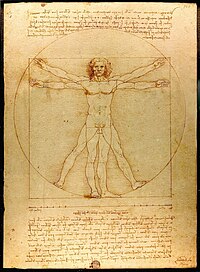Libertarian humanism
| Part of a series on |
| Humanism |
|---|
 |
| Philosophy portal |
Libertarian Humanism, or individualist humanism, is a movement within the lifestance of humanism which departs from the contemporary trend of atheist and new atheist sympathies within the American Humanist Association; embraces individualism and anarchist principles; and rejects any government affiliation, not unlike a separation of church and state[1] . Libertarian humanists understand humanism to be a personal choice rather than an institutional choice; within libertarian humanism, diversity is embraced and fostered.
American scientist and communicator, Dr. Carl Sagan, denied atheism as rash and too hasty:
I am not an atheist. An atheist is someone who has compelling evidence that there is no ... God. I am not that wise, but neither do I consider there to be anything approaching adequate evidence for such a god. Why are you in such a hurry to make up your mind? Why not simply wait until there is compelling evidence?' and advising correspondents, only that you be open to the possibility that you are wrong, and not confuse what feels good with what’s true.[2]
Lifestances, philosophies and religions are often included within the libertarian humanist mindset, holding that religion and spiritual philosophies are pillars of humanity; and that fundamentally, no two humans view the world in the same ways, having diverse backgrounds, appreciations, sentiments, cultures and societies[3] .
The positive value of the critical principles of pure reason in relation to the conception of God and of the simple nature of the soul, admits of a similar exemplification; but on this point I shall not dwell. I cannot even make the assumption—as the practical interests of morality require—of God, freedom, and immortality, if I do not deprive speculative reason of its pretensions to transcendent insight. For to arrive at these, it must make use of principles which, in fact, extend only to the objects of possible experience, and which cannot be applied to objects beyond this sphere without converting them into phenomena, and thus rendering the practical extension of pure reason impossible. I must, therefore, abolish knowledge, to make room for belief. The dogmatism of metaphysics, that is, the presumption that it is possible to advance in metaphysics without previous criticism, is the true source of the unbelief (always dogmatic) which militates against morality. - Immanuel Kant[4]
My response to all this is that greater stress on Humanism's affirmative ethics of creativity and joy is a more effective way of presenting the Humanist philosophy to the public. Humanism welcomes all life-enhancing and healthy pleasures, from the rollicking enjoyments of youth to the contemplative delights of mellowed age, from the simple gratifications of sports and the out-doors, to the more complex appreciation of art and literature, drama and cinema, friendship and social communion. Humanists believe in the beauty of love and the love of beauty. All the many-sided possibilities for good in human living the Humanist would weave into a sustained pattern of happiness under the guidance of reason. Exuberance is the watchword of the Humanist ethic. [5]
For the Council of Secular Humanism, Tom Flynn writes, Secular humanism’s cognitive thrust lies in its naturalistic worldview; its emotional or affective thrust lies in its positive ethical outlook. Each element is equally essential to secular humanism; neither stands alone. I submit that this meaningfully differentiates secular humanism from religious humanism, and from simple atheism as well. Continuing with Hitchens’s language, secular humanists necessarily disbelieve in God (naturalism) and just as necessarily oppose thuggery and tribalism on principle (an outgrowth of ethics). Of course, many atheists, agnostics, and religious humanists do the same. But when atheists and agnostics adopt positive ethics, they do so for reasons independent of their atheism or agnosticism. When religious humanists defend naturalism, they do so for reasons outside the boundaries of their religious humanism. Only for the secular humanist do both commitments arise organically within his or her life stance.[6]
See also[edit]
References[edit]
- ↑ Tolstoy, Leo. "On Anarchy". www.theanarchistlibrary.org. The Anarchist Library. Retrieved 18 January 2017.
- ↑ Achenbach, Joel. "Library of Congress obtains astronomer Carl Sagan's personal papers". www.washingtonpost.com. The Washington Post. Retrieved 10 March 2015.
- ↑ http://pluralism.org/religions/humanism/humanist-tradition/humanism-as-a-belief-system/
- ↑ Kant, Immanuel. "Critique of Pure Reason". www.gutenberg.org. Project Gutenberg. Retrieved 26 March 2016.
- ↑ Lamont, Corliss. "The Affirmative Ethics of Humanism". www.corliss-lamont.org. Corliss Lamont. Retrieved 8 March 2015.
- ↑ Flynn, Tom. "Secular Humanism Defined". www.secularhumanism.org. Council for Secular Humanism. Retrieved 10 March 2015.
External links[edit]
http://www.corliss-lamont.org/ethics.htm Corliss Lamont, 'The Affirmative Ethics of Humanism'
This article "Libertarian humanism" is from Wikipedia. The list of its authors can be seen in its historical. Articles copied from Draft Namespace on Wikipedia could be seen on the Draft Namespace of Wikipedia and not main one.
